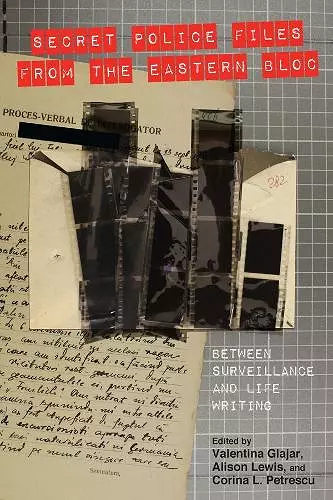Secret Police Files from the Eastern Bloc
Between Surveillance and Life Writing
Alison Lewis editor Corina Petrescu editor Valentina N Glajar editor
Format:Hardback
Publisher:Boydell & Brewer Ltd
Published:15th Dec '16
Currently unavailable, and unfortunately no date known when it will be back

New essays exploring the tension between the versions of the past in secret police files and the subjects' own personal memories-and creative workings-through-of events. The communist secret police services of Central and Eastern Europe kept detailed records not only of their victims but also of the vast networks of informants and collaborators upon whom their totalitarian systems depended. Theserecords, now open to the public in many former Eastern Bloc countries, reflect a textually mediated reality that has defined and shaped the lives of former victims and informers, creating a tension between official records and personal memories. Exploring this tension between a textually and technically mediated past and the subject/victim's reclaiming and retrospective interpretation of that past in biography is the goal of this volume. While victims' secret police files have often been examined as a type of unauthorized archival life writing, the contributors to this volume are among the first to analyze the fragmentary and sometimes remedial nature of these biographies and to examine the subject/victims' rewriting and remediation of them in various creative forms. Essays focus, variously, on the files of the East German Stasi, the Romanian Securitate (in relation to Transylvanian Germans in Romania), andthe Hungarian State Security Agency. Contributors: Carol Anne Costabile-Heming, Ulrike Garde, Valentina Glajar, Yuliya Komska, Alison Lewis, Corina L. Petrescu, Annie Ring, Aniko Szucs. Valentina Glajar is Professor of German at Texas State University, San Marcos. Alison Lewis is Professor of German in the School of Languages and Linguistics, The University of Melbourne, Australia. Corina L. Petrescu is Associate Professor of Germanat the University of Mississippi.
Well researched and engagingly written . . . provides the reader with a wealth of sources and personal accounts of secret police influence, intervention, and collusion. . . A fascinating account of personal reflection, blackmail, and bribery taken from the existing files of East Germany, Hungary and Romania. * JOURNAL OF CONTEMPORARY HISTORY *
The volume eloquently examines and contextualises the secret police files past and present, and offers ways of reading and problematising them. . . . [This book] is a much welcome contribution for historians, political scientists, life writing and Eastern European studies scholars. -- Ioana Luca * LIFE WRITING *
Overall the volume provides an interesting, creative and productive insight into aspects of the legacy of the socialist regimes as well as the Secret Police archives . . . It will be of interest to scholars working in history and on history writing, to regional experts, social scientists as well as literary and media scholars. * CONTEMPORARY CENTRAL & EASTERN EUROPE *
[T]he essays indicate the complex ways in which surveillance, collaboration and victimhood come to colonize the bodies and minds of all involved. . . . Th[e] collection . . . is instructive and thought-provoking, and certainly worth a read. -- Sarah Colvin * JOURNAL OF EUROPEAN STUDIES *
[This book] will not resolve the legal and ethical challenges facing post-communist states. It does, however, invite us to rethink how we read secret police files, and offers several creative ways to do so. It deserves a wide readership among scholars of the GDR and other communist regimes. * GERMAN QUARTERLY *
[This] book is . . . an exercise in 'repurposing' this huge body of material, in putting it to good and sometimes surprising use in starting the process of democratizing and absorbing it into contemporary histories and stories. Without being prescriptive, it suggests three distinct but equally productive approaches. -- Brigid Haines * SEMINAR *
This assured and compelling volume offers differentiated readings of file stories, while also raising important questions about how this difficult past continues to be remembered, or forgotten, today. -- Dierdre Byrnes * EUROPEAN HISTORY QUARTERLY *
Takes the reader [on] a journey into the everyday life of the darkest days of East-Central Europe. Although addressing mainly scholarly audiences, this book also discusses issues of [wider] interest. * HUNGARIAN CULTURAL STUDIES *
ISBN: 9781571139269
Dimensions: unknown
Weight: 530g
252 pages